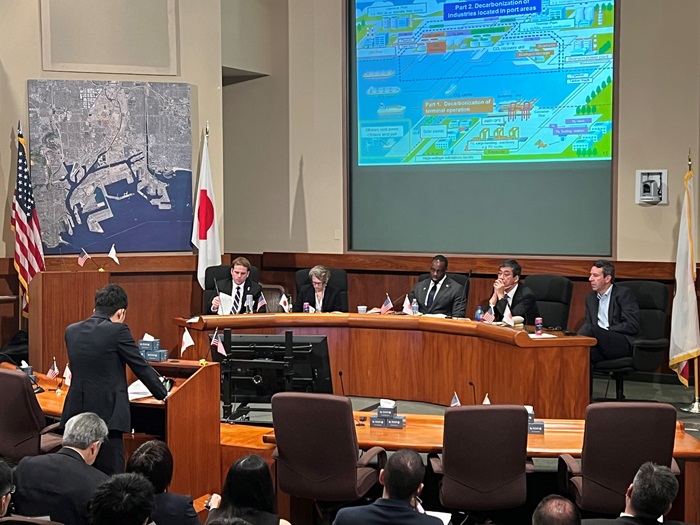Port Decarbonization Symposium builds on pact signed in Tokyo earlier this year
LOS ANGELES – Representatives from sectors spanning the global supply chain and leaders of major seaports on both sides of the Pacific informed California and Japanese transportation officials of their efforts to move toward zero-emission operations during an insightful conference today at the Port of Los Angeles.
Co-hosted by the California State Transportation Agency (CalSTA) and the Japanese Ministry of Land, Infrastructure, Transport and Tourism (MLIT), the Port Decarbonization and Green Shipping Corridor Symposium was the first opportunity for information sharing since the signing of a Letter of Intent in Tokyo earlier this year to support the development of green shipping corridors, expand offshore wind and reduce the carbon footprint of ports in Japan and California.

From left: Trelynd Bradley, Deputy Director, GO-Biz; Patty Monahan, Commissioner, California Energy Commission; Toks Omishakin, Secretary, California State Transportation Agency; Masahiro Inada, Director-General, Japan Ports and Harbors Bureau; Hector De La Torre, Board Member, California Air Resources Board; hear from a Japanese official on the country's Carbon Neutral Port initiative.
“California has already taken critical steps to cut port-related pollution since our pact with Japan – notably our historic port and freight infrastructure package with $450 million in zero-emission investments that Governor Newsom announced in July,” said California Transportation Secretary Toks Omishakin. “This symposium is an important next step to keep building momentum on both sides of the Pacific to achieve our ambitious climate goals while powering the new green economy. I thank the Japan MLIT for their continued collaboration, along with the port directors and wide range of industry experts who shared their knowledge today.”
“We expect that today’s symposium will serve as an opportunity to advance discussions toward establishing green shipping corridors together with port management, shipping companies and other stakeholders,” said Masahiro Inada, Director-General of Ports and Harbors Bureau, Japan MLIT.
During the symposium, high-level representatives from all parties to the Letter of Intent heard directly from the directors of four California ports – Hueneme, Long Beach, Los Angeles and Oakland – and four Japanese ports – Kobe, Nagoya, Tokyo and Yokohama – about efforts to form green shipping alliances and cut planet-warming pollution from port activities. In just the past year, the Port of Los Angeles has signed agreements with the ports of Yokohama, Tokyo and Nagoya. The Port of Long Beach has an alliance with the Port of Kobe, and Thursday, the Port of Oakland and the Port of Long Beach each signed climate agreements with the Port of Yokohama.
Marine terminal operators, ocean shipping companies and trucking representatives also provided updates on their progress making their sectors – all key links in the global supply chain – more sustainable.
One major topic throughout the symposium was the recent announcement that California will receive up to $1.2 billion from the U.S. Department of Energy to establish a national hydrogen hub to accelerate the development and deployment of clean renewable hydrogen. The ports of Long Beach and Los Angeles – the largest port complex in the Western Hemisphere – are project partners and will receive a portion of the state’s grant funds to advance the use of hydrogen fuel in goods movement.
Japan has been an early pioneer of clean renewable hydrogen and is already working to introduce the zero-emission fuel into its port and shipping sectors, making the country a natural partner as California begins to develop its own hydrogen market. MLIT is promoting the country’s “Carbon Neutral Port initiative” to decarbonize terminal operations and other port activities by establishing ways to harness hydrogen, ammonia and other alternative energy sources. At the symposium, officials from Japanese ports discussed developing hydrogen energy supply chains, and leaders from private Japanese companies detailed their market-leading work on hydrogen fuel cell vehicles.
The symposium took place amid the backdrop of a rapidly changing supply chain since the onset of the COVID-19 pandemic. Following widespread disruptions that sent shockwaves throughout the economy in 2021, global shipping and port activity has stabilized, with attention now shifting to making the supply chain more efficient and sustainable. International maritime shipping accounts for roughly 3% of planet-warming pollution worldwide.
CalSTA will share findings from the symposium at the Asia-Pacific Economic Cooperation (APEC) Forum in San Francisco next month, with the potential to springboard more subnational partnerships.
A recording of the symposium is available online.
# # #

